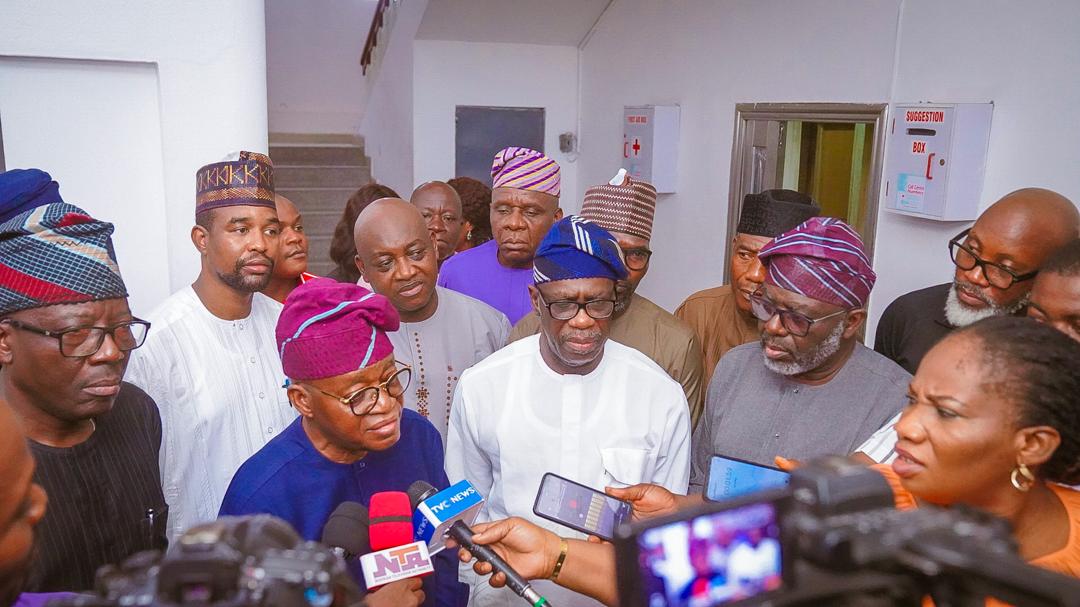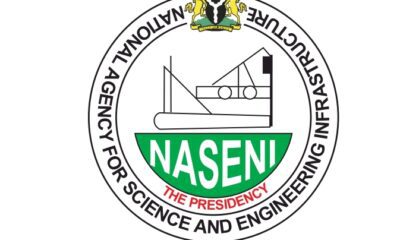Business
NASENI partners Agric Ministry on agro-industrialisation
The National Agency for Science and Engineering Infrastructure (NASENI) and the Federal Ministry of Agriculture and Food Security have commenced discussions on how to deploy existing technical competencies and other resources by the two institutions to improve agro allied-industries development targets, climate change mitigations and smart solar irrigation aimed at dry-season farming.
The trio of the Minister of Agriculture & Food Security, Senator Abubakar Kyari, the Minister of State, Hon. Sabi Aliyu Abdullahi and the Executive Vice Chairman and Chief Executive Officer of NASENI, Mr. Khalil Suleiman Halilu who held the meeting in Abuja yesterday 6th November, 2023 agreed that the nascent collaboration between NASENI and Agric Ministry was aimed at enhancing the focus and deliverables toward achievement of the Renewed Hope Agenda by the President Bola Ahmed Tinubu administration.
The Minister, Senator Abubakar Kyari gave insight to some of the essentials in the 8-Point Renewed Hope Agenda of the government, saying that about six of the eight socio-economic recovery programmes have the starting points in their achievements rooted in the success of the Agricultural sector, his ministry.
Therefore, the Minister commended Halilu, EVC NASENI and his team for having agriculture as one of the Agency’s target areas to work.
“I won’t be tired of saying that President Bola Ahmed Tinubu has given my Ministry the responsibility to carry out one of the important programmes in the 8-point Renewed Hope agenda, which is food security and five others,” he said.
During the visit, Halilu was received not only by Senator Abubakar Kyari and the Minister of State, but all the directors in the Ministry were present at the meeting. Halilu said the Agency was ready to collaborate with the Ministry to boost agriculture and also achieve food security through technology adaptation and transfers.
Addressing the Ministry’s top government functionaries, Halilu explained that NASENI’s technical manpower, technologies and also international partners were ready to work in ensuring that Nigeria becomes self-sufficient in food production, food processing and exports.
Part of the efforts in actualising this goal, he disclosed, is the ongoing NASENI Scheme to refurbish about 50,000 broken tractors across the country under the presidential initiative, aimed at bringing back the culture of large cultivation of lands for farming.
According to him, the management of NASENI has secured both local and international technical partners to work with the Agency to mass-produce Unmanned Aerial Vehicles (UAVs) for spraying of insecticides over vast farm locations, sustain afforestation, introduce solar-powered water irrigation to increase wet and dry season farming yields, cold chain food processing and agro-allied value chain additions for preservation and processing of foods in commercial quantities and exports.
Halilu said the list of the collaboration plans with the Agric Ministry includes crop traceability, rice straw project, mitigation of climate change through scientific and technological researches or innovations by NASENI to increase food production, value addition and ensure Nigeria’s dependence on food imports reduce significantly.
“We are embarking on development activities in agriculture from production to commercialisation. The key thing is how we can add value to our farm produce or raw materials before they are consumed or before exporting them out of our country.
“Also as for foreign technologies brought into our country, we are seeking the cooperation and collaboration of the Ministry to transfer, domesticate and commercialise such technologies. In a nutshell, this is why we are here,” Halilu stated.
The EVC said since assuming office, he has been receiving a lot of requests in terms of how NASENI could add value around agriculture from production all the way to the market. He disclosed that a recent outing by the Agency at the Belt and Road Initiative (BRI) Forum in China attracted about $6 billion dollars investment and about 40 percent of the monies will be channeled to agriculture.
As his remark on the significance of the meeting, the Minister of State expressed appreciation of the visit by NASENI’s EVC and his team, describing the move as progressive and patriotic.
He said the time to put an end to inter-ministerial competition and rivalry is now, rather, synergy and collaboration amongst government institutions should become the new culture and orientation. He underscored the earlier statement by the Senior Minister that one of the Federal Government’s current priorities is food security.
Therefore, he called for alignments with the Agric Ministry’s focus not only by NASENI but other Agencies with related functions in order to actualise the Government’s intentions to alleviate poverty, create jobs and tackle all other socio-economic ills in Nigeria society.
Business
Oyetola in Lagos, defies downpour, embarks on inspection tour


By Seun Ibiyemi
The rain in Lagos began very early on Thursday morning. But the torrential rainfall did not stop Minister of Marine and Blue Economy, Adegboyega Oyetola, CON, from embarking on the tour of two key institutions that were recently brought under his ministry — the Nigerian Institute for Oceanography and Marine Research (NIOMR) and the Liaison office of the Department of Fishery and Aquaculture, which houses College of Fishery, Lagos.
His first port of call was NIOMR, where the Chief Executive of the institute, Prof. Abiodun Sule, took the Minister through some of its strategic breakthroughs, including unveiling some of the different species of fish in our waters.
The Minister charged the Institute to take up the challenge of mapping out the country’s various marine resources, saying the country needs to know what it has and in what quantity.
He charged the staff to redouble their efforts and ensure they find a solution to the rising cost of fish feeds in Nigeria. The Minister reiterated his desire to increase local production of fish, while reducing dependence on importation.
From the Institute, Oyetola and his entourage, which included the Permanent Secretary, Oloruntola Olufemi; Director, Maritime Safety and Security, Babatunde Bombata, and the Executive Director, Engineering and Technical Services, Engr. Ibrahim Umar, who represented the the MD of NPA, headed for the Department of Fishery and Aquaculture, where the delegation inspected the Laboratory and charged the staff not to lower the standard of monitoring and inspection so as to ensure the country’s exporters are not blacklisted by the International community and also ensuring that those being imported meet required standard.
He assured the staff of both institutions of his commitment to their welfare, while urging them to also increase their capacity and productivity, as he wants to see the fishing contribute to job creation and increase in revenue of the FG.
The elated members of staff promised the Minister not to let him down and pledged their commitment to the vision and mission of the Minister with respect to the maritime sector.
Business
CPPE urges CBN to halt interest rate tightening, as businesses are yet to recover from previous hikes


The Centre for the Promotion of Public Enterprise (CPPE) has called on the Central Bank of Nigeria (CBN) to slow down on monetary policy tightening ahead of its Monetary Policy Committee (MPC) meeting this month, stating that businesses are yet to recover from the hawkish monetary policy stance in the last two months.
The Centre stated this in its reaction to the latest inflation figures published by the NBS where headline inflation rose to 33.69 percent in the month of April from 33.20 percent in March.
According to the statement signed by the Director-General of the CPPE, Dr Muda Yusuf, monetary policy tools should be paused for the fiscal side of the economy to work towards addressing the supply issues affecting the inflation dynamics in the country.
He stated, “Meanwhile we urge the monetary policy Committee to soften its monetary tightening stance for the time being. Businesses are yet to recover from the shocks of the recent bullish rate hikes. The monetary instruments should be put on pause while fiscal policy tools address supply-side factors in the inflation dynamics.”
Furthermore, the Centre appreciated the slowdown in inflation for the month, especially headline and food inflation, but noted that the main drivers of price hikes (food, transport, insecurity in farming communities and other structural problems) are yet to cool down.
He explained that the drivers of inflation are supply-based and being addressed by the fiscal authorities. Also, Dr. Yusuf doubled down on his call to the Nigerian Customs Service (NCS) to set a quarterly exchange rate between N800 and N1000 for import duties assessment, noting that the continuous fluctuation has a pass-through effect on inflation.
In his words, “Meanwhile the exchange rate benchmark for the computation of import duty continues to be a major concern to businesses as it has become a major inflation driver. We again urge the CBN to peg the rate at between N800 -N1000/dollar to be reviewed quarterly. This is necessary to reduce the pass-through effect of heightening trade costs on inflation.”
Meanwhile, the CPPE also lauded the commencement of refining by the Dangote refinery, stating that it would help slow down inflation in the short term.
Recall that Nigeria’s inflation rate rose to 33.69 percent in April on the back of an increase in food and transport prices. The rate is one of the highest in about 28 years.
The CBN, in an effort to rein in inflation, has increased
Business
April 2024: FG, States, LGs share N1,208.081trn


The Federation Account Allocation Committee (FAAC), at its May 2024 meeting chaired by the Minister of Finance and Coordinating Minister of the Economy, Wale Edun, shared a total sum of N1,208.081 Trillion to the three tiers of government as Federation Allocation for the month of April, 2024 from a gross total of N2,192.007 Trillion.
From the stated amount inclusive of Gross Statutory Revenue, Value Added Tax (VAT), Electronic Money Transfer Levy (EMTL), and Exchange Difference (ED), the Federal Government received N390.412 Billion, the States received N403.403 Billion, the Local Government Councils got N293.816 Billion, while the Oil Producing States received N120.450 Billion as Derivation, (13 percent of Mineral Revenue).
The sum of N80.517 Billion was given for the cost of collection, while N903.479 Billion was allocated for Transfers Intervention and Refunds.
The Communique issued by the Federation Account Allocation Committee (FAAC) at the end of the meeting indicated that the Gross Revenue available from the Value Added Tax (VAT) for the month of April 2024, was N500.920 Billion as against N549.698 Billion distributed in the preceding month, resulting in a decrease of N48.778 Billion.
From that amount, the sum of N20.037 Billion was allocated for the cost of collection and the sum of N14.426 Billion given for Transfers, Intervention and Refunds. The remaining sum of N466.457 Billion was distributed to the three tiers of government, of which the Federal Government got N69.969 Billion, the States received N233.229 Billion, Local Government Councils got N163.260 Billion.
Accordingly, the Gross Statutory Revenue of N1,233.498 Trillion received for the month was higher than the sum of N1,017.216 Trillion received in the previous month of March 2024 by N216.282 Billion. From the stated amount, the sum of N59.729 Billion was allocated for the cost of collection and a total sum of N889.053 Billion for Transfers, Intervention and Refunds.
The remaining balance of N284.716 Billion was distributed as follows to the three tiers of government: Federal Government got the sum of N112.148 Billion, States received N56.883 Billion, the sum of N43.855 Billion was allocated to LGCs and N71.830 Billion was given to Derivation Revenue (13 percent Mineral producing States).
Also, the sum of N18.775 Billion from Electronic Money Transfer Levy (EMTL) was distributed to the three (3) tiers of government as follows: the Federal Government received N2.704 Billion, States got N9.012 Billion, Local Government Councils received N6.308 Billion, while N0.751 Billion was allocated for Cost of Collection.
The Communique also disclosed the sum of N438.884 Billion from Exchange Difference, which was shared as follows: Federal Government received N205.591 Billion, States got N104.279 Billion, the sum of N80.394 Billion was allocated to Local Government Councils, while N48.620 Billion was given for Derivation (13 percent of Mineral Revenue).
Oil and Gas Royalties, Companies Income Tax (CIT), Excise Duty, Petroleum Profit Tax (PPT), Customs External Tariff levies (CET) and Electronic Money Transfer Levy (EMTL) increased significantly, while Import Duty and Value Added Tax (VAT) recorded considerably decreases.
According to the Communique, the total revenue distributable for the current month of April 2024, was drawn from Statutory Revenue of N284.716 Billion, Value Added Tax (VAT) of N466.457 Billion, N18.024 Billion from Electronic Money Transfer Levy (EMTL), and N438.884 Billion from Exchange Difference, bringing the total distributable amount for the month to N1,208.081 Trillion.
The balance in the Excess Crude Account (ECA) as at May 2024 stands at $473,754.57.
-
Finance4 months ago
Court orders Sen. Victor Umeh to repay N136m bank debt to AMCON
-



 Abuja Update3 months ago
Abuja Update3 months agoUNDP, FG partnership needed to achieve inclusion, equity- Minister
-
Abuja Update2 months ago
Banks drive stock market performance with N147bn gain
-
capital market2 years ago
Rt.briscoe, FBNH, Others halts negative performance of stock market
-
Submission Guidelines4 months ago
CALL FOR SUBMISSIONS: POETRY COLUMN-NND
-



 Health1 month ago
Health1 month agoCapacity training will reduce migration of health workers- NPHCDA
-



 Business4 weeks ago
Business4 weeks agoTingo Group unveils Tingo Electric, Tingo Cola drink at Lagos launch
-
News5 months ago
Oil thieves sponsoring malicious media campaign against Navy – Spokesman












